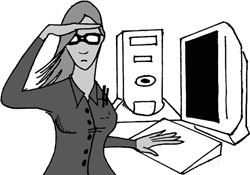![[Metroactive Features]](/features/gifs/feat468.gif)
[ Features Index | Silicon Valley | Metroactive Home | Archives ]
 geeks.ca By Annalee Newitz YOU'D THINK computer culture would be universal, and in some ways it is. UNIX is UNIX no matter where you live, and, despite language barriers, the Argentina free software community shares a lot of code with the Japanese and American free software communities. Science and engineering translate better than poetry and social values, if you know what I mean. But computers themselves are part of culture. The role of these machines in a given social group changes dramatically from region to region. Obviously, being a geek in Silicon Valley is nearly the opposite of being one in, for example, a place like rural Idaho. In Silicon Valley, a land where thick glasses are sexy and functional autism rules at social gatherings, most kids have access to computers by the time they're in kindergarten. If they want to learn C++ in high school, there are dozens of bookstores which sell manuals about it and user groups to help them through. But in a rural area, geeks are often the sum of the insults and beatings they've received from the brutally normal people around them. If they want to discuss the finer points of Linux 4.4, it's very unlikely they'll have discussions with anyone. Still, the geek has a certain power in Idaho and similar places that she doesn't have in San Jose. She has the power to bootstrap, to escape, to become something other than somebody's wife, a soccer mom, a maid, or a smudge on the payroll of a dying industry. All this became obvious to me during my winter vacation, which I spent in a small prairie city known as Saskatoon in a rural Canadian province known as Saskatchewan. I wanted to get away from everything; I wanted to see snow and trees and utterly unspoiled expanses of land stretching for miles. And, I'll admit, I happen to know somebody who grew up in Saskatoon who wanted to go home and visit with his family and old friends. If it weren't for Jesse's connection to the place, I probably wouldn't have wound up there. And because of his ability with computers, Jesse hasn't wound up there either--nor have any of his friends, all of whom "rode the Internet out," as Jon Katz would say. Saskatoon is like an impoverished version of Berkeley, California. It's a university town, and Saskatchewan's flagship public campus fills the city with kids who rave and read Foucault and write essays about the province's history of socialist agitators in the Agrarianist movement. Hippies run co-ops and natural food markets. And high speed Internet is widely available. But jobs aren't. Many educated young people struggle to find any kind of employment that fits with their training; those without any college face a depressed economy which offers them very little. Computer geeks who choose to stick it out here are given few options: become a network administrator, work for the government in a job which may or may not become interesting, or get out. Young Saskatoon geeks with a hankering for programming paradise take a path that seems to start in Calgary and lead outward to one of the coasts, possibly even in the States. Of course, moving to the States to get your geek cash is the national equivalent of selling out if you're a Canadian. It's like working for Microsoft--it's lucrative and stable, but you're working for the man. You might say that a Saskatoon kid who gets into computers isn't doing the same thing a Tokyo kid or San Francisco kid is. Sure, she's immersed in the same language of programming, processors, operating systems, video cards, whatever. But when a San Francisco kid starts thrashing out little Java programs, it's par for the course. Everybody's doing it. You're in the middle of the information economy. When a Saskatoon kid stays up all night hacking, he's building a future. He's going somewhere. Maybe all the way to California, where jobs are plentiful even in the worst of times, and the local industry is still one of the most important in the world. In some ways, science and engineering aren't cross-cultural at all. Although we sometimes like to imagine that, say, a perl tool for crunching genetic data can transcend social barriers, there are many reasons why it can't. Doing good engineering requires having access to social and economic resources, neither of which are evenly distributed across the globe. And thus the computer isn't just affecting the way we do science, it's affecting migration patterns, changing the social fabric of entire regions like Saskatchewan, where the geeks are leaving in droves. Instead of bringing people across the globe together, computers sometimes rip them apart, exacerbating social differences rather than eroding them.
Annalee Newitz (sask@techsploitation.com) is a surly media nerd who knows where Moose Jaw is. [ Silicon Valley | Metroactive Central | Archives ]
|
From the January 3-9, 2002 issue of Metro, Silicon Valley's Weekly Newspaper.
Copyright © 2002 Metro Publishing Inc. Metroactive is affiliated with the Boulevards Network.
For more information about the San Jose/Silicon Valley area, visit sanjose.com.